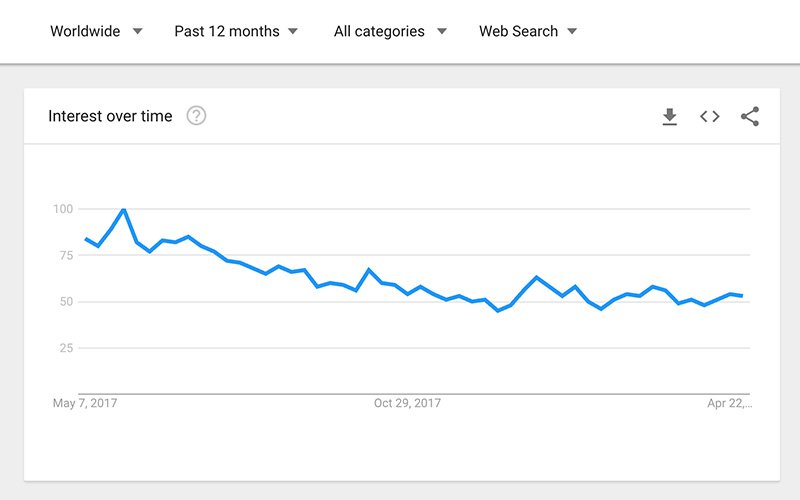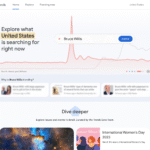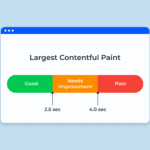📈 7 Powerful Truths About Google Trends Data You Can’t Afford to Ignore
Google Trends Data: In an era where data drives the world — from elections to e-commerce — Google Trends is more than just a nerdy tool for marketers. It’s a public thermometer of human curiosity, an invisible thread connecting what we think, search, and need.
- 📚 What Is Google Trends?
- 🕰️ A Quick Timeline of Google Trends: The Evolution of Insight
- 🧠 1. Understanding the Core: How Google Trends Calculates Data
- 📊 2. Facts That Make Google Trends Uniquely Valuable
- 💬 3. Popular FAQs: Google Trends Simplified
- Q1. Is Google Trends accurate?
- Q2. Can Google Trends be used for business?
- Q3. Is it free to use?
- Q4. Does it update in real-time?
- Q5. Is it only for marketers?
- 🌟 4. Why Google Trends Is Emotionally & Socially Powerful
- 🧭 5. Observance in Daily Life: How People Are Already Using It (Without Realizing!)
- ❤️ 6. Why We Should All Wish to Use Google Trends Better
- 🏆 7. Key Significance of Google Trends in Society
- 🌞 Wishing for a Data-Informed Future
- 🧩 Important Points to Remember
- 💡 Final Thoughts: Google Trends Isn’t Just a Tool — It’s a Lens to See the World
- ✅ Summary
But how do we truly understand Google Trends data? What’s behind those charts, spikes, and numbers? What do they really say about society, people, and even YOU?
Let’s embark on a journey into the heart of Google Trends data, uncovering its purpose, history, significance, emotional value, and most importantly — its daily life impact.
📚 What Is Google Trends?
Google Trends is a free online tool by Google that shows how frequently a particular search term is entered into Google Search relative to total search volume over time.
It offers:
Real-time data
Regional breakdowns
Search interest over time
Comparison between search terms
Related topics and rising trends
But most importantly, it reveals what millions are thinking — from buying behavior to societal concern.
🕰️ A Quick Timeline of Google Trends: The Evolution of Insight
| Year | Milestone |
|---|---|
| 2004 | Google starts collecting global search data |
| 2006 | Google Trends launched in beta format |
| 2008 | Comparison feature added |
| 2012 | Realtime data and design refresh |
| 2015 | Major mobile-friendly update and category filters |
| 2020 | COVID-19 creates the most searched queries in Google history |
| 2023 | AI-integration for trend prediction and visualization |
What started as a curiosity tool is now one of the most used public data sets on Earth.
🧠 1. Understanding the Core: How Google Trends Calculates Data
Google Trends doesn’t show absolute search volume. Instead, it shows normalized values:
Score 100: Highest popularity of the term
Score 50: Half as popular
Score 0: Not enough data
This normalization means the data reflects interest over time, not sheer number of searches.
For example:
If “budget 2025” scores 100 in January and 30 in March, it doesn’t mean 30 people searched — it means interest fell to 30% of the January peak.
📊 2. Facts That Make Google Trends Uniquely Valuable
🌎 Tracks data from over 200 countries
📅 Offers data since 2004
🔍 Supports search categories like News, Shopping, YouTube, Image
💡 Uses aggregated and anonymized data — no personal information ever shown
📥 Data can be exported in CSV for researchers and students
📍 Offers regional and city-level insights (great for hyperlocal studies)
💬 3. Popular FAQs: Google Trends Simplified
Q1. Is Google Trends accurate?
✅ Yes — for relative popularity and patterns. It’s backed by Google’s data infrastructure.
Q2. Can Google Trends be used for business?
Absolutely! It’s a goldmine for:
Product research
Content creation
Seasonal trends
Consumer behavior analysis
Q3. Is it free to use?
Yes. 100% free. No sign-up needed.
Q4. Does it update in real-time?
Yes. Google Trends offers real-time data for the last 7 days and historical data up to 2004.
Q5. Is it only for marketers?
No! Students, journalists, teachers, NGOs — anyone can use it.
🌟 4. Why Google Trends Is Emotionally & Socially Powerful
This isn’t just a tool; it’s a mirror of humanity’s pulse.
During COVID-19, searches like:
“Symptoms of coronavirus”
“How to make sanitizer”
“Lockdown rules near me”
…showed the anxiety, care, and learning drive of people around the world.
During elections, Google Trends reveals how citizens are:
Curious about candidates
Researching manifestos
Fact-checking rumors
It represents our fears, hopes, and actions.
🧭 5. Observance in Daily Life: How People Are Already Using It (Without Realizing!)
| Use Case | Real-Life Application |
|---|---|
| 🧑💼 Marketers | Plan product launches based on demand spikes |
| 🧑🎓 Students | Find trending research topics |
| 📰 Journalists | Validate breaking news via search spikes |
| 📱 Influencers | Jump on viral topics before they peak |
| 📈 Stock Traders | Monitor public sentiment around companies |
Example: A YouTuber might compare “ChatGPT” vs. “Bard AI” to plan their next video — based on rising interest.
❤️ 6. Why We Should All Wish to Use Google Trends Better
We wish every citizen had access to data tools like this to:
Be informed rather than manipulated
Predict upcoming needs (like job searches, flu waves, travel trends)
Create useful, timely content
Understand what the world cares about
In a time when misinformation spreads like wildfire, Google Trends offers clarity.
It’s not what people claim — it’s what they actually search that speaks louder.
🏆 7. Key Significance of Google Trends in Society
| Domain | Why It Matters |
|---|---|
| 🏛️ Governance | Public opinion gauge for policies |
| 🏥 Healthcare | Early warnings for disease outbreaks |
| 🏫 Education | Academic relevance and current events understanding |
| 🛍️ Retail | Demand prediction and inventory planning |
| 🌐 Media | Truth-checking tool for sensational news |
It’s one of the few free tools that democratize insight. From a small business in Nagpur to a policymaker in Delhi — everyone can benefit.
🌞 Wishing for a Data-Informed Future
We wish to see a future where school children are taught to use Google Trends, where community leaders use it to understand people, and where creators stop guessing and start researching.
When someone says, “Nobody cares about this anymore,” wouldn’t it be great to check Google Trends and know for sure?
Let’s wish for a society where data is empowering, not overwhelming.
🧩 Important Points to Remember
Google Trends doesn’t show search volume — it shows interest relative to peak.
Always compare keywords to get contextual insight.
Filter by region, time, and category to narrow your focus.
It’s not about exact numbers, but about patterns and behavior.
💡 Final Thoughts: Google Trends Isn’t Just a Tool — It’s a Lens to See the World
Understanding Google Trends data is like learning to read a map of human intention.
It tells us:
What we’re curious about
What scares us
What entertains us
What we ignore
What we can’t stop searching
It connects data with behavior, and behavior with decision-making.
If you’re a creator, thinker, educator, or leader — make it your habit to open Google Trends once a day. Like brushing your teeth or checking the weather — it helps you know the world, before it changes again.
✅ Summary
✅ Google Trends shows search interest over time and by location.
✅ Normalized values (0–100), not absolute search numbers.
✅ It’s FREE, powerful, and open to all.
✅ Vital for journalism, marketing, education, and civic research.
✅ Reflects human behavior, emotion, and societal shifts.








